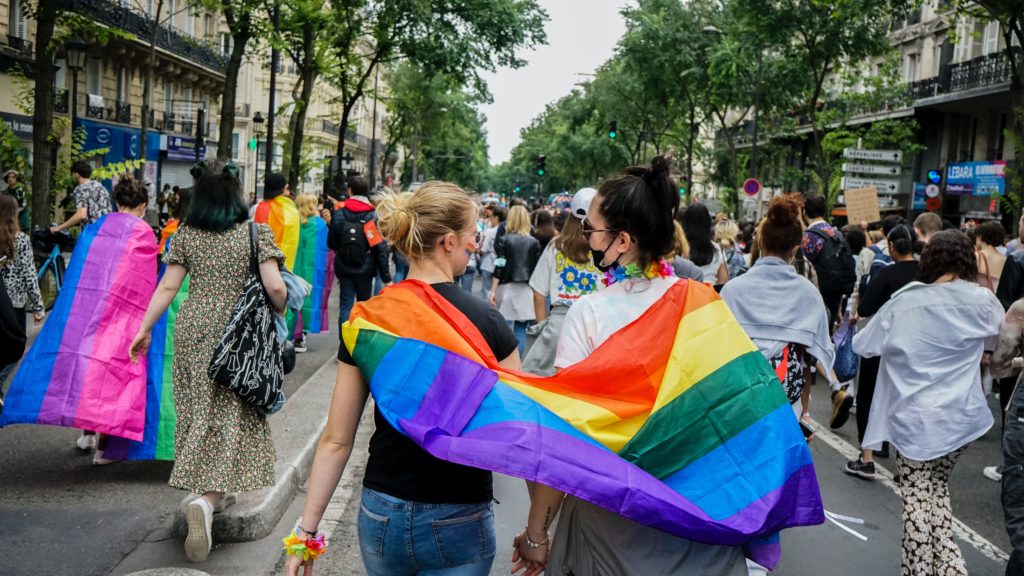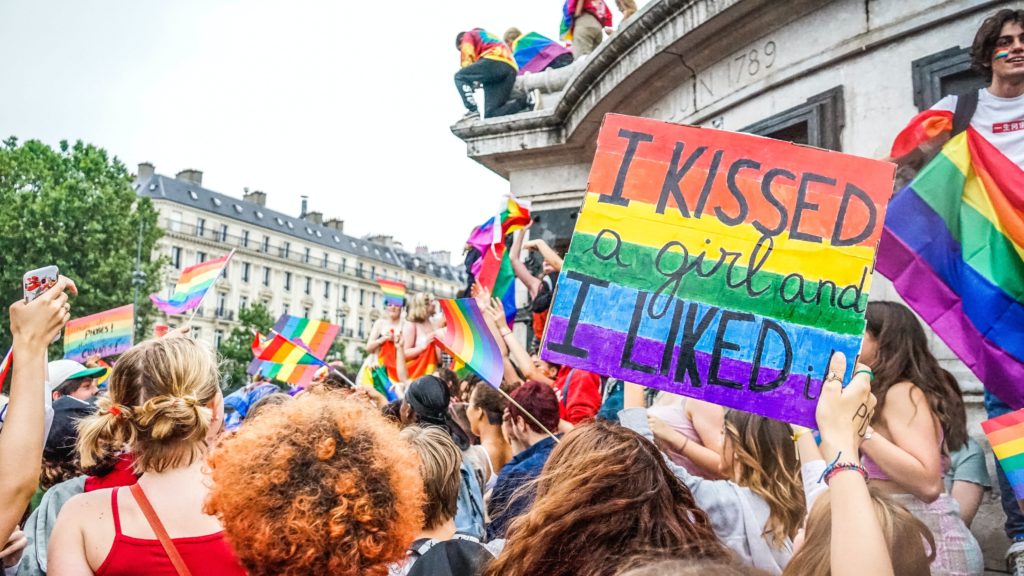Have you ever questioned your sexuality but then told yourself that you are actually 100% heterosexual, that life is easier or better as a straight person, that you will definitely end up with the opposite gender (not including different gender identities in this thought), that being straight is the good, the normal way of life? That would be the short summary of compulsory heterosexuality. 
In most societies, heterosexuality is seen as the norm and even promoted as such. It’s the natural state, the “normal” order enforced in and by a patriarchal and heteronormative society. Heterosexuality is seen as the default—everything else is a deviation from the norm.
It is exactly this compulsory heterosexuality that had me confused for most of my teenage years/young adulthood, when I thought I was straight like everyone else. Coming from a small village, there wasn’t any representation of anything else anyway. It starts from a very young age when grown-ups say things like: Oh look, those toddlers are playing together, they will get married one day. “He’ll be breaking all the girls’ hearts,” “Lock her up, or the boys will go crazy about her,” “Is he your boyfriend?” to a three-year-old child is also part of the compulsory heterosexuality that is engrained in society and is considered normal and fun, even though it is kinda creepy.
As a child, I accepted all of this. Agreed with it even. It was normal, right? Me playing with my two male best friends in kindergarten must have meant that I would go on and marry one of them as most people suggested. Looking back now, I can see quite a few early childhood signs that I was not straight and just living in a heteronormative world.
- My Barbies were often gay couples (two Barbies or two Ken dolls, but mainly the Barbies)
- I always played the boy in play-pretend but never once in my life did I want to be a boy. I simply wanted to be in the position of the boy, which in that case meant getting the girl or doing the stereotypical masculine things
- My room was covered in Emma Watson posters. I always thought I was just a massive Harry Potter fan (which is true, but it was exclusively Emma Watson). Turns out I did not just want to be like her, I rather wanted to be with her
- I was always much closer with boys and my friend group was mainly boys for the longest time. To this day, I get along with guys much easier than with girls. Your group of friends of course doesn’t define your sexuality, but there are aspects of my friendships that I would consider a part of my queerness
- It’s always been a lot easier for me to name a female celebrity crush, starting with cartoon characters (Disney princesses and Shego from Kim Possible fans, I am talking to you)
During my teenage years I started to occasionally question whether I was truly only attracted to guys. While questioning and learning more about what queerness or bisexuality meant, I still considered following things to be completely normal:
- As a “straight” person, thinking it’s objective and uncontested that most women are way more attractive than most men
- Being jealous of guys in movies when they got the girl instead of only drooling over the guy
- Thinking that my interest in women was a reaction caused by the objectification of women in media and the patriarchal ideas that we are fed daily
- Taking the “are you gay” quiz more than once and getting a little too excited when it gave me gay or bisexual as a result
- Asking Google: signs that I am gay/am I gay/how to know if you are gay (If you are asking the internet about your sexuality, you are 99.9% not heterosexual)
- Checking the levels on the Kinsey Scale
When I was 16, I started dating this really amazing guy. We were together for 3.5 years and I can honestly say that he was my first love and that I really loved him with all my heart. But this just made me even more confused once we broke up. After we ended our relationship, I decided to give in to my feelings and start exploring my sexuality. I still thought I would end up with a guy and even though by then I labelled myself bisexual, I figured getting together with a guy eventually would just happen. It would be easier and would fit the norm.
For the longest time I also thought that:
- Writing my bachelor thesis on LGBTQ+ Tourism
- Getting super excited and invested in LGBTQ+ characters and storylines on TV and in movies and getting emotionally involved in gay love stories even if they were only minor characters or minor story arcs (thankfully, this is changing)
just meant that I was a really strong ally to the community. Even after starting to see myself as a bisexual, I still considered myself somewhat more of a very invested ally. Well, turns out that the following feelings and thoughts I had and the things I did during that time are not necessarily “the norm” and it probably should have been a massive indication that maybe I should reconsider what I was thinking and doing:
- Confusing friendship with attraction: I crushed on boys and later men super-fast and easy, but then lost interest very. quickly again. This has been a big thing for most of my life because for me there was no difference between a male crush and friendship
- Confusing liking to be desired by men to desiring them: I liked attention/feeling wanted by men but then whatever came after, I oftentimes didn’t really care anymore
- Since breaking up with my long-term boyfriend, I’ve only been interested in unavailable guys (people in relationships where I knew nothing could or would happen, players etc.—that way I could keep my distance. Simultaneously, I tend to only be attracted to men until they show an interest as well
- Pleasure. I won’t go into a lot of detail here, but anyone should experience pleasure and enjoy sex. If you don’t, or you feel like something is off, take the time to figure it out. Of course, that doesn’t mean your sexuality is different from what you thought, but it could be. Make sure you really know what you want and what you are looking for

Looking back, there are many more things throughout my childhood that could have hinted at my queerness, but because of compulsory heterosexuality I just brushed them off as some insignificant occurrence. Sure, not all the points on my list necessarily mean you are LGBTQ+, but throughout the years I have seen many similarities and overlapping points with other queer people. For many of them, compulsory heterosexuality played a big part in not realizing it sooner or suppressing their identity longer. While things are slowly changing, we still live in a world that sees heterosexuality as the norm and queerness as something unnatural or something bad. But we shouldn’t be afraid to be ourselves and if you are unsure about your sexuality because of compulsory heterosexuality don’t worry—there is absolute no need to label yourself. I used to call myself bisexual, for a while I thought I might be a lesbian, but I have realized I do like more than one gender. I now just say I am queer without specifically using any other label. It’s totally up to you how you identify. Just don’t let others tell you how you should or shouldn’t be. 🙂
Also by Rebecca: How Coming To Terms With My Sexuality Made Me a More Compassionate Vegan
Get more like this—Sign up for our daily inspirational newsletter for exclusive content!
__
Photo: Unsplash
